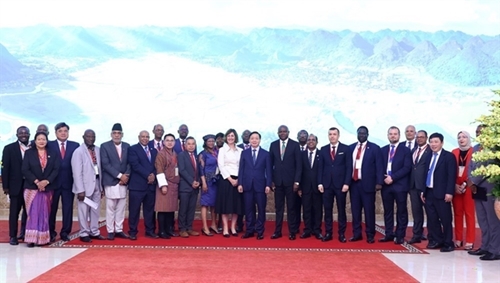Ha made the remark on July 15 while hosting a courtesy reception for a delegation of agriculture ministers and senior officials attending a high‑level inter‑regional forum on the One Commune – One Product (OCOP) model, jointly organized by Vietnam’s Ministry of Agriculture and Environment and the Food and Agriculture Organization of the United Nations (FAO).
    |
 |
|
Deputy Prime Minister Tran Hong Ha and delegates taking part in the high‑level inter‑regional forum on the OCOP model, jointly organized by Vietnam's Ministry of Agriculture and Environment and the FAO |
The Deputy PM said Vietnam hopes that the forum would become a platform for sharing both successful and unsuccessful experiences, as well as for reaching a shared understanding in the context of over 800 million people around the world facing hunger.
He highlighted that one of the key strengths of Vietnam’s OCOP program is its close alignment with the goals of building new-style rural areas and eliminating poverty. The program benefits from state budget support and focuses on improving knowledge and promoting rural modernization.
Vietnam has so far developed more than 16,000 OCOP products, rated from one to four stars. Deputy PM Ha noted that the Government is working to enhance product branding and standardization so that these products can reach five-star quality and access international markets, thereby contributing to sustainable poverty reduction efforts.
The official underlined the importance of establishing a post-forum coordination mechanism among Vietnam, FAO, and participating countries to ensure that the forum’s outcomes translate into concrete actions. He proposed that FAO take the lead in facilitating this collaboration, helping countries identify high-quality agricultural products, promoting mutual support, and supplying those products for regional markets.
He also called on FAO and participating countries to join Vietnam in building a joint initiative endorsed by high-ranking leaders to ensure that the benefits of international agricultural cooperation directly reach all people, especially farmers.
Beth Bechdol, FAO Deputy Director-General, praised Vietnam’s remarkable achievements in agricultural development, especially its OCOP program. She said Vietnam not only focuses on agricultural production and trade but also integrates OCOP with cultural values and local knowledge, delivering broad social benefits to communities.
This success, she noted, is a source of inspiration for many countries grappling with food security, climate change, and rural development challenges. Drawing from Vietnam’s experience, FAO is committed to continuing its support, deepening cooperation, and promoting OCOP as a global initiative to contribute to an innovative, humanistic, and sustainable agricultural future.
Delegates at the meeting also voiced strong support for open cooperation and experience sharing among countries in agricultural production and food-nutrition security, particularly as many face serious challenges such as shrinking arable land, wildlife conflict, climate change, and economic insecurity.
The forum, taking place on July 15 and 16, saw the participation of officials from Bhutan, Cameroon, Côte d’Ivoire, the Democratic Republic of the Congo, Gabon, Ghana, Ethiopia, Lesotho, Malawi, Mozambique, Nepal, Sierra Leone, South Sudan, Tunisia, Vietnam, Zambia, and Zimbabwe.
Source: VNA